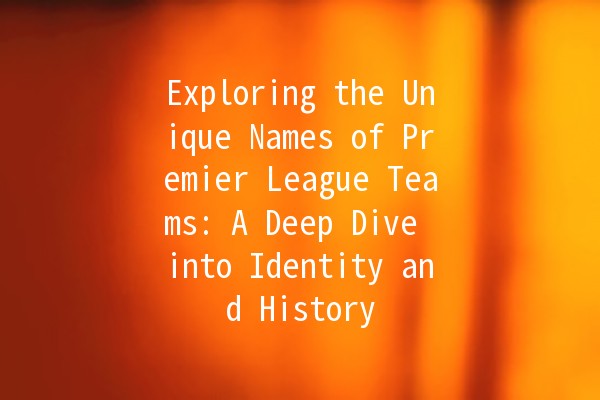The Premier League is more than just a football competition; it’s a cultural phenomenon that unites millions of fans around the globe. A significant part of this identity lies in the unique names of its teams. From the grandiosity of Manchester United to the geographical roots of Newcastle United, team names tell a story that connects fans to their communities, histories, and traditions. In this article, we’ll delve into the fascinating world of Premier League team names, exploring their origins, significance, and how they reflect the clubs’ identities.
Understanding the Origins of Team Names

Many Premier League teams derive their names from their geographical locations. This practice helps establish a local identity that resonates with fans and players alike. For instance, teams like Tottenham Hotspur and Liverpool are explicitly tied to the areas they represent.
Example : Liverpool FC was founded in 1892, named after the city of Liverpool, which is steeped in maritime history. The name immediately connects the team with its city, fostering local pride.
The history surrounding the formation of football clubs often influences their names. Many teams reflect historical events, significant figures, or existing establishments in their names.
Example
Some team names hold deeper symbolic meaning or reference cultural elements that resonate with their fan base. They serve to inspire and unite supporters.
Example
The Evolution of Team Names in the Premier League
As football continues to evolve, so do the names of teams. While some clubs stick with their traditional monikers, others have adapted their identities to meet contemporary standards. This evolution reflects broader societal changes and cultural shifts.
Many clubs have experienced formal name changes over the years, either through rebranding initiatives or mergers with other teams. This has sometimes raised eyebrows among traditionalists.
Example : Wimbledon FC famously relocated and changed its name to Milton Keynes Dons in the early 2000s. This shift not only changed the club's identity but also ignited debates about authenticity and tradition in football.
In recent years, the focus on marketing has led many clubs to consider how their names resonate on international platforms. Clubs have been known to adopt nicknames or abbreviations that appeal to a broader audience.
Example
Unique Factors Influencing Team Names
Several unique factors play a crucial role in shaping the identities reflected in team names.
The cultural landscape of a city often influences its football team's identity. This is vividly portrayed through the clubs' names, nicknames, and the fan culture surrounding them.
Example
Rivalries between teams can influence the narrative surrounding their names. Such rivalries often give rise to unique nicknames that are passed down through generations.
Example
Five Strategies to Enhance Engagement with Team Names
To further engage your audience and deepen their understanding of Premier League team names, consider the following strategies:
Engage fans with interactive content related to team names on social platforms. Create polls or quizzes regarding the history and meaning behind names.
Example: A campaign asking fans to define what the name "Arsenal" means to them can foster community and pride.
Host events centered on local heritage and the stories behind team names. This initiative can help revive and enhance local support and engagement.
Example
Establish a blog series that delves into the history and significance of each Premier League team’s name. Encourage fans to share their associations with the name.
Example: A dedicated article on the historical context of Newcastle United could attract both history buffs and football fans alike.
Create merchandise that highlights the meaning and history behind team names. This addition not only serves a practical purpose but also sparks conversations among fans.
Example : Tshirts that feature quotes or historical anecdotes about clubs can provide fans with a tangible connection to their team's heritage.
Encourage fan participation in naming initiatives for new ventures, such as stadium expansions or community projects. This interactivity can foster loyalty and appreciation for the club’s identity.
Example: Ask fans for input on naming a new fan zone after a historical figure significant to the club, promoting a sense of inclusion in the club’s present and future.
Frequently Asked Questions
Team names are a significant part of a club's identity, reflecting history, geography, and culture. They foster a strong sense of community and belonging among fans.
Many clubs provide resources through their websites, including historical articles and documentaries. Local libraries and historical societies can also be excellent sources of information.
Yes, team names can change due to rebranding, mergers, or changes in location. Such changes often aim to create a modern appeal or reflect new ownership or focus.
Rivalries can contribute to the cultural narratives surrounding team names, often inspiring nicknames or unique identifiers that encapsulate the competitive spirit between teams.
Geographical references in a team's name link the club to its local community, fostering local pride and loyalty among the fan base. This connection is crucial for regional support.
Yes, many clubs' names reflect significant historical events or local heritage. For instance, some clubs were founded during particular socioeconomic periods, shaping their identities.
By understanding the myriad influences behind the names of Premier League teams, fans can develop a deeper affinity for their clubs. The stories encapsulated in these names contribute to the rich tapestry of football culture, showcasing how history and identity interweave in the beautiful game. Whether you're a lifelong fan or new to the world of football, exploring these names opens up an enriching dialogue that connects us all.